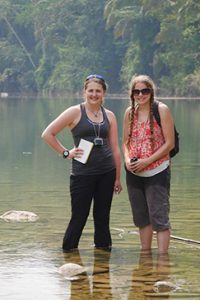
Dr. Sarah Praskievicz is a hydrologist who studies rivers and climate change in order to examine river flows to help predict flooding and analyze the environmental impacts of water policies. She has been a theme leader at the National Water Center’s Summer Institute for the past two summers and is in her third year as a geography professor at The University of Alabama.
“I see climate change as one of the most pressing issues facing humanity for the next century and beyond,” Praskievicz said. “I found that water resources are some of the impacts of climate change that are most significant. Water and climate change are just so interconnected and water is vital to society and ecosystems.”
Her current research looks at state policies that create standards for the amount of water left in a river to maintain ecosystems versus being used for irrigation and other purposes. She has compared Mississippi’s minimum flow standard policy for its rivers to the lack of any such policy in Alabama in order to help determine what is necessary to keep the ecosystems in rivers healthy. She has collaborated with Dr. Bennett Bearden, the director of the Water Policy and Law Institute and a geography professor at UA, in order to look at both the environmental and legal effects.
RECENT ACHIEVEMENTS
Praskievicz was nominated for a Nystrom Award from the American Association of Geographers and was a finalist in 2015 for her streamflow research.
BACKGROUND
Geography was not Praskievicz’s first choice. She majored in environmental studies as an undergraduate, deciding she wanted to take her passion for the outdoors into a meaningful career. After taking geography classes, she realized how much she enjoyed the field as it combined all of her interests in one.
She conducted research in snowmelt rivers at the University of Oregon and studied the Cahaba River in the Southern heat. She said she likes being at UA because of the connection with the National Water Center and opportunities to make an impact as Alabama is behind on water policies.
“Part of the reason I like being a geographer is that our field is so broad,” Praskievicz said. “There are so many serious threats to the environment and everyone in the public should be aware of it.”
PUBLICATIONS
Her recent research on Mississippi and Alabama water policies will be coming out in journals within the near future as she and Bearden make conclusions after their year-long study.
Her recent publications include her article, “A coupled hierarchical modeling approach to simulating the geomorphic response of river systems to anthropogenic climate change” and “Frost for the trees: Did climate increase erosion in unglaciated landscapes during the late Pleistocene?”
IMPACT
Praskievicz’s work with the National Water Center helps educate students from around the country and improve flood predictions to help better emergency responses.
Her research on state water policies and the impacts on watersheds may give insight into the type of water policy necessary to maintain Alabama’s diverse freshwater ecosystems.
“Hopefully what we find by examining both the scientific and legal aspects of these policies are recommendations for how to move forward with developing environmental instream flow policies for Alabama,” Praskievicz said.